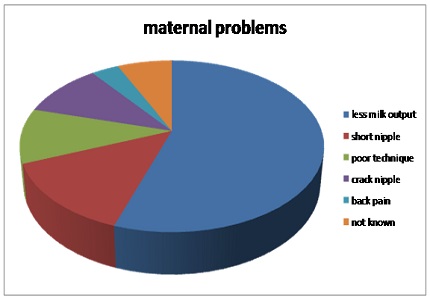Hypernatremic dehydration in exclusively breast fed neonates: a clinical study
Abstract
Introduction: Neonatal hypernatremic dehydration is a very serious condition and there has been an increase in the incidence of hypernatremic dehydration in breast fed infants in the first week of life. Hypernatremia in neonates is found to be due to inadequate breast feeding or insufficient milk production. This study was conducted to look at the prevalence, clinical symptoms, signs and risk factors associated with hypernatremia in exclusively breast fed healthy neonates.
Methodology: A Retrospective cross-sectional study conducted at KVG Medical College Sullia on 29 neonates with hypernatremic dehydration who were recruited during the period from June 2016 to April 2017. Healthy term neonates with birth weight more than 2.5kg, on exclusive breast feeding were considered for the study. Maternal problems regarding breast feeding were assessed. Serum sodium level more than 145meq/L was considered as hypernatremia in our study.
Results: Out of 32 neonates with hypernatremic dehydration, 29 were enrolled in the study as 3 were excluded because of low birth weight. Male babies were affected more than female babies with 16 (55.17%) and 13 (44.83%) respectively. The main presenting features were fever (100%), poor feeding (65.52%) and jaundice (51.72%). The maximum number of babies who had hypernatremic dehydration presented in 46 hours to 60 hours of life (day 2-3). The results showed that the hours of life / day of presentation with hypernatremic dehydration has significant correlation with neonate’s serum sodium concentration (P value <0.05), indicating insufficient milk production in the mother during first few days. According to our study, babies born to primiparous women are more likely to be affected with hypernatraemic dehydration than multiparous women.
Conclusion: It is recommended that dehydration and problems related can be considered as prime reason for fever during the first few days of life in low-risk term neonates. Special attention to antenatal care, postnatal care regarding early initiation of breast feeding and careful watch of neonates during the first week of life could decrease the incidence of neonatal hypernatremia.
Downloads
References
2. Boskabadi H, Maamouri G, Ebrahimi M, Ghayour-Mobarhan M, Esmaeily H, Sahebkar A, et al. Neonatal hypernatremia and dehydration in infants receiving inadequate breastfeeding. Asia Pac J Clin Nutr.2010;19(3):301-7.
3. Mujawar NS, Jaiswal AN. Hypernatremia in the neonate: Neonatal hypernatremia and hypernatremic dehydration in neonates receiving exclusive breastfeeding. Indian J Crit Care Med 2017;21:30-3. DOI: 10.4103/0972-5229.198323.
4. Livingstone V H , Willis C E , Abdel-Wareth L O et al. Neonatal hypernatremic dehydration associated with breast-feeding malnutrition : a retrospective survey.Cannadian Med Asso J.2000;162(5):647-52.
5. Bhat SR, Lewis P, David A, Liza SM. Dehydration and hypernatremia in breast-fed term healthy neonates. Indian J Pediatr. 2006 Jan;73(1):39-41. [PubMed]
6. Caglar MK, Ozer I, Altugan FS. Risk factors for excess weight loss and hypernatremia in exclusively breast-fed infants. Braz J Med Biol Res. 2006 Apr;39(4):539-44. Epub 2006 Apr 3. [PubMed]
7. Neville MC, Allen JC, Archer PC, Casey CE, Seacat J, Keller RP, Lutes V, Rasbach J, Neifert M. Studies in human lactation: milk volume and nutrient composition during weaning and lactogenesis. Am J Clin Nutr. 1991 Jul;54(1):81-92.
8. Morton JA. The clinical usefulness of breast milk sodium in the assessment of lactogenesis. Pediatrics. 1994 May;93(5):802-6.
9. Sofer S, Ben-Ezer D & Dagan R. Early severe dehydration in young breast-fed newborn infants. Israel Journal of Medical Sciences.1993;29(2-3): 85-89.
10. Scott JX, Raghunath,Gnananayagam JE, Simon A. Neonatal hypernatremic dehydration and malnutrition associated with inadequate breastfeeding and elevated breast milk sodium. J Indian Med Assoc. 2003;101(5):318-21.
11. Moritz M L , Manole D M, Bogen L D et al.Breastfeeding-Associated Hypernatremia: Are We Missing the Diagnosis?.PEDIATRICS 2005;116(3):e343-47.DOI:10.1542/peds.2004-2647.
12. Manganaro R, Mami C, Marrone T, Marseglia L, Gemelli M. Incidence of dehydration and hypernatremia in exclusively breast-fed infants. J Pediatr. 2001;139(5):673-5.DOI:10.1067/2001.118880.

Copyright (c) 2017 Author (s). Published by Siddharth Health Research and Social Welfare Society

This work is licensed under a Creative Commons Attribution 4.0 International License.


 OAI - Open Archives Initiative
OAI - Open Archives Initiative


